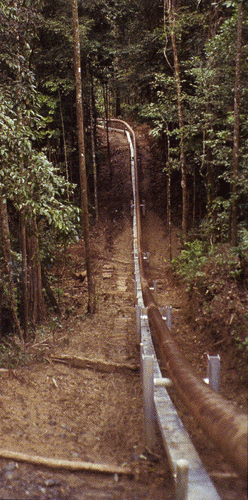April 27, 2007
Ecuador says it will wait a year to see whether the international community takes its offer to forsake development of a giant oil field in the Amazon rainforest in exchange for compensation, reports the Environmental News Service (ENS).
Ecuadorian President Rafael Correa says that if the country is compensated with half of the forecasted lost revenues, it will not exploit oil in Yasuni National Park, setting aside the area for wildlife and indigenous people. Correa said the cost would be about $350 million per year.
"The first option is to leave that oil in the ground, but the international community would have to compensate us for immense sacrifice that a poor country like Ecuador would have to make," ENS reports Correa as saying in a recent radio address. "Ecuador doesn't ask for charity, but does ask that the international community share in the sacrifice and compensates us with at least half of what our country would receive, in recognition of the environmental benefits that would be generated by keeping this oil underground."
 Between the 1967 and the 1990s, the Oriente rainforest of Ecuador suffered serious degradation and deforestation from Texaco's oil extraction and production activities. Originally it appeared that Texaco (now Chevron) might pull out of the Oriente without reparations, but widespread protests by indigenous peoples, environmentalists, and human rights organizations forced Texaco into negotiations. Texaco projected its clean up costs at a moderate US$5-10 million. Suggested reading: Savages, a book by Joe Kane, tells the story of the Huaorani, a tribe living in the deepest part of the Amazonian rain forest in Ecuador, and their struggles with Texaco. |
Oil operations in the Ecuadorian rainforest have been controversial since American oil giant Texaco (now a subsidiary of Chevron) entered the region in 1958. Environmental groups and indigenous rights' organizations said Texaco's oil exploitation caused widespread pollution and environmental damage and blames the firm for high rates of cancer among local populations. Chevron is currently facing a $6 billion lawsuit on behalf of more than 30,000 affected people.
Correa's offer is seen as an "unprecedented opportunity" by some environmentalists reports ENS.
"This presents a landmark opportunity to sequester up to half a billion tons of CO2 while conserving Yasuní's astounding biodiversity and cultural heritage," Max Christian of the Sustainable Development and Conservation Biology program at the University of Maryland told ENS. "If the international community is serious about mitigating climate change and impacts to ecosystems, structuring a debt-for-carbon swap here offers a very real financing possibility."


I think this is obviously an unprecedented proposal, and it may not appeal to many people. Ecuador is however a very poor country who does have to balance between paying the massive external debt, providing services to its people and at the same time care for its amazingly biodiverse environmental heritage. I believe that if we think of president Correa's proposal in that framework we would see that the whole world does share the responsibility of saving this forest. On the other hand, hopefully if the money is raised to save YASUNI, it does go to be used in proper social projects.
ReplyDelete